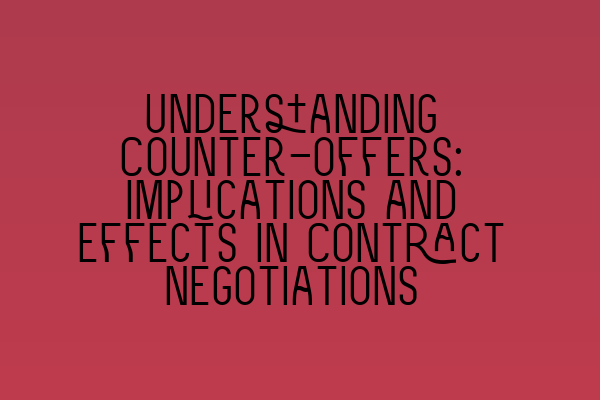Understanding Counter-offers: Implications and Effects in Contract Negotiations
When engaging in contract negotiations, it is essential to have a comprehensive understanding of the implications and effects of counter-offers. A counter-offer refers to a response made by one party to a contract negotiation in which they propose different terms or conditions than those initially offered by the other party. This blog post aims to shed light on the significance of counter-offers and how they can impact contract negotiations.
1. The Nature of Counter-offers
Counter-offers are a common occurrence in contract negotiations, as both parties seek to secure the most favorable terms for their respective interests. When a counter-offer is made, it signifies a rejection of the original offer and the initiation of new terms. It is important to note that counter-offers can take various forms, including changes to price, terms, delivery dates, or any other contractual provision.
2. The Impact of Counter-offers
Counter-offers have significant implications for contract negotiations. Firstly, a counter-offer terminates the original offer, rendering it null and void. Therefore, it is crucial to carefully evaluate the terms of any counter-offer received to determine its potential impact on the negotiation process.
Secondly, counter-offers introduce a new set of terms, indicating that parties must engage in further negotiation to reach a mutually acceptable agreement. This ongoing negotiation process may involve multiple counter-offers and counter-counter-offers until both parties reach a consensus.
3. Legal Ramifications
Counter-offers have legal ramifications that must be taken into account during contract negotiations. It is crucial to remember that a counter-offer effectively extinguishes the original offer made by the other party. Consequently, the original offer cannot be accepted after a counter-offer has been made.
Moreover, counter-offers create a temporary power shift between the parties involved. The party making the counter-offer becomes the offeror, while the other party assumes the role of the offeree. This shift in positions can influence the balance of power and leverage during negotiations.
4. Importance of Documenting Counter-offers
To protect your interests and avoid misunderstandings, it is imperative to document all counter-offers and responses throughout the negotiation process. This documentation serves as evidence of the parties’ intentions and can be crucial in the event of a dispute.
5. Key Considerations for Handling Counter-offers
When faced with a counter-offer, it is essential to consider the following:
a. Evaluate the Counter-offer: Carefully review the terms of the counter-offer and assess its impact on your objectives and requirements. Determine if the proposed terms align with your desired outcome.
b. Counter the Counter-offer: If the terms of the counter-offer are not in your favor, you have the option to propose your own counter-counter-offer. This back-and-forth negotiation process allows both parties to refine and fine-tune the terms until a mutually acceptable agreement is reached.
c. Seek Legal Advice: Engaging the services of a solicitor with expertise in contract law can be highly beneficial during contract negotiations involving counter-offers. They can provide valuable guidance, ensure legal compliance, and help protect your rights and interests.
6. Conclusion
In contract negotiations, counter-offers play a pivotal role in shaping the final agreement. Understanding the implications and effects of counter-offers can empower you to navigate these negotiations and secure the most favorable terms for your business or personal objectives. By documenting all counter-offers and being strategic in your responses, you can ensure a smoother negotiation process while safeguarding your legal rights and interests.
For more information on contract law and preparing for the SQE exam, check out these related articles:
1. SQE 1 Practice Exam Questions
2. SQE 1 Practice Mocks FLK1 FLK2
3. SQE 2 Preparation Courses
4. SQE 1 Preparation Courses
5. SRA SQE Exam Dates
Remember, a thorough understanding of counter-offers is crucial for successful contract negotiations.
